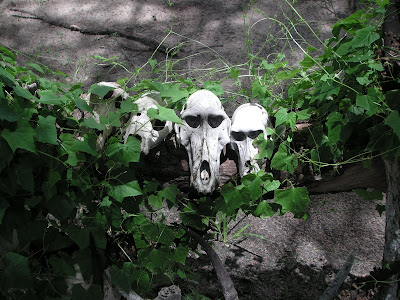 Last night's post finally helped me go to sleep -- as I hope this one will. And I hope this is not the beginning of a habit! I had to go back today to see what I wrote. Two things came to mind. One is that the mental process I described. how I write [some kinds of things] was described in an article in The New Yorker not long ago. I read all the medical/mental articles. This one was about how ideas are formed. Researchers just love MIRs for seeing what's happening in the brain, they watch areas, big but ever smaller it seems, light up when mental activities are in process. They can see that literally the logical side of the brain shuts down and blink! the illogical side takes over when a new idea pops up. They admit there is more to know ... there always will be. At least I hope there will be. I want to think the human mind is too complex and various and wonderful to ever be entirely mapped -- after all it's not like the once mysterious "New world" that is now so entirely known.
Last night's post finally helped me go to sleep -- as I hope this one will. And I hope this is not the beginning of a habit! I had to go back today to see what I wrote. Two things came to mind. One is that the mental process I described. how I write [some kinds of things] was described in an article in The New Yorker not long ago. I read all the medical/mental articles. This one was about how ideas are formed. Researchers just love MIRs for seeing what's happening in the brain, they watch areas, big but ever smaller it seems, light up when mental activities are in process. They can see that literally the logical side of the brain shuts down and blink! the illogical side takes over when a new idea pops up. They admit there is more to know ... there always will be. At least I hope there will be. I want to think the human mind is too complex and various and wonderful to ever be entirely mapped -- after all it's not like the once mysterious "New world" that is now so entirely known.So what I'm saying is my internal assessment of what happens IS what happens, in the broadest of terms. I've never found another person so interested in their own brain's function as I am but I know they exist. That's the truth part of the title.
The untruth part is that when I write memoir pieces like the one mentioned, I am usually aware of occasions when I embellish, distort, omit or otherwise play fast and loose with facts. I did it with that piece, just slightly for the sake of literary balance and because some bits weren't clear in my memory. I do it with most memory pieces. I don't know if all writers of memoir [or tiny bits and pieces which is all I write] consciously distort as I do. Probably most do. And others probably misremember. I know historians love going to the "source" to get the "real story" of what happened when, say a President met with an advisor. Always question. Always, always question everyone's version of history. No two people will remember the same incident the same way -- as lawyers and judges and psychiatrists all know. I'll say mea culpa. Lots of people won't.








 <
< a onblur="try {parent.deselectBloggerImageGracefully();} catch(e) {}"
a onblur="try {parent.deselectBloggerImageGracefully();} catch(e) {}" 













